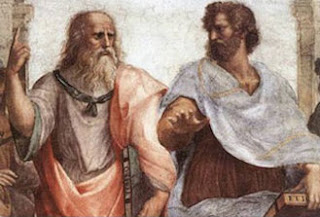Christopher Dawson, the great
Catholic historian of the twentieth century, pinned history to a genuine
anthropology, which includes its religious roots, and so nurtured a rich
awareness of human development. This is so unlike that of contemporary culture
that is possessed by neo-Marxist ideology and expresses a profoundly diminished
and deformed view of human development. Christopher Dawson’s book “Progress and
Religion” (especially Part II) is essential reading for today.
The rise of world religions.
The kind of culture that was
bound up with fixed ritual culture became un-progressive. We see this in the
civilisations of the Near East and of Egypt.
However, in the first
millennium BC a huge cultural change took place. It was a change of thought
rather than of material culture. It was a consequence of the movement of
peoples and invasions which had been taking place; an old culture meeting a
‘new’ culture created a spirit of critique and reflection, which had been
absent up until then.
The old order, which was a
manifestation of divine power encountered another order of evil and wrongdoing.
And so there arose a sense of moral dualism – that which is and that which ought
to be. Men began to compare the world they knew with an ideal social and moral
order, and judged it accordingly – the belief in a sacred order that governs
all things was re-formed. What had once been a vital force became a moralising
and spiritual force.
Ritual was the starting point
for the new development, but now this ritual had ethical content. This is best
seen in Confucianism in China, and also in India and in Persia – the Rites are
like rules. So too in Greece, the performance of sacred rites continued to have
great importance, even after the emergence of the mythology of the Olympian
deities.
This new, 1st
millennium BC, movement gave rise to the concept of a universal order, which is
both spiritual and material, and which is immanent in nature and in the moral
life of man. Now began the search for a higher principle, one which transcends
all forms of existence – the search for the Absolute. In Greece, this search
found its fullest expression in philosophy.
The concept of an Absolute
reality became the foundation of a new moral ideal; rights and duties gave way
to an ethic of renunciation and detachment. This ascetic ideal found its highest
expression in Buddhism – the desire not to know the true nature of being, but
the desire to be delivered from it. For Buddha, salvation is not in
metaphysical knowledge, but is in strenuous moral endeavour that destroys desire.
It is a reaction to intellectualism, and a denial of the world of phenomena.
The cultures which are based
upon these religions tended not to advance in power and knowledge, but to become
static and retrograde, becoming absorbed by the previous culture.
The Hellenic view of the world,
accepting the unity of the cosmic order and allowing intellectual freedom, led
to the recognition of a higher reality which transcends change and limitation.
This found classical expression in Plato: the mind turns away from the changing
world of experience to the world of the eternal Forms.
Now, whereas in the East an
ethic of renunciation came into being, in the West illumination was sought not
by detachment from reality, but by scientific knowledge. The form of science
that developed in the West was not a utilitarian one, but was for the
contemplation of Being.
The change which took place
in the world at the start of the first millennium was linked to astronomy; that
there is an eternal cycle, which is reflected in the order of nature. Now the
concept of an eternal cycle is something that is irreconcilable with the idea
of progress. Aristotle did try to leave room for contingency and free will, but
the notion of an eternal cycle dominated the ancient mind.
The astronomical outlook of
the ancients – that the movement of the starts determines/is reflected in the
course of worldly events – is nearer to modern scientific determinism, than it
is to popular superstition or astrology.
Why was the idea of progress
absent from the ancient mind? It is because the Greek mind sought to know the
cosmic process as a whole. It did not look to partial understanding, nor did it
enquire into the particular case, as does modern science. The Greeks sought to
know the foundation of Being itself; change is mere illusion – the Law of the
Universe must be supreme. Even so, the world of phenomena needed to be reconciled with the unchanging unity of true Being.















No comments:
Post a Comment